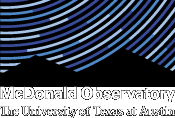Universo radio program celebrates 10 years, brings astronomy & skylore to Spanish-speaking audience
1 March 2005
Austin, Texas — On April 1, The University of Texas McDonald Observatory will celebrate 10 years of producing Universo, its daily two-minute, Spanish-language radio program about astronomy. Universo is heard on about 180 U.S. radio stations (including stations in the top 10 markets), as well as in Canada, Colombia, El Salvador, Mexico, and Venezuela. The program has a daily U.S. listenership of about 220,000, plus more than one million international listeners.
Universo covers topics in skywatching, the science of astronomy and what astronomers do, the history of astronomy, and skylore. “We try to bring in topics that are culturally specific, like the skylore and observational astronomy of the Maya, Incas, and the Aztecs,” said Damond Benningfield, writer and producer of Universo. “As much as possible, I try to identify and talk about Hispanic astronomers, space scientists, and astronauts — so that people can understand that there are Latinos in the space science field.
“The Spanish-speaking population in the U.S. and Texas is growing,” said Dr. David Lambert, director of McDonald Observatory. “The Spanish-speaking audience is underrepresented in the fields of science and math. Our goal is, by exposing people to bits of science that are accessible, to help people think of science in a different way, to be more interested in science, and to be more willing to support science in general.”
The idea for the program first came in 1993, said Benningfield, who also produces the StarDate radio program. He recalls meeting Arturo Vasquez at a Public Radio Conference in Washington, DC. Then, Vasquez was president of station KXCR in El Paso. The station was producing an internationally distributed news program in Spanish, and wanted to do a science program. The collaboration with StarDate, McDonald Observatory’s long-running astronomy radio program, was a natural. A proposal was submitted to the National Science Foundation (NSF), and the program was funded for an initial three years to the tune of $600,000. NASA’s National Space Grant Consortium provided an additional $100,000 for Universo’s first three years.
Today, stations still receive the program free of charge. McDonald Observatory is actively seeking underwriters and sponsors for Universo production and distribution. Program costs are currently funded by McDonald Observatory, and also funded in part by grants from NASA and NSF. Past Universo sponsors have included NASA, the SBC Foundation, the American Honda Foundation, The Joe and Teresa Lozano Long Foundations, National Instruments, Harcourt General Foundation, the Goodman-Abell Foundation, and the Brown Family Fund.
The program is recorded in El Paso at the studios of the Self Reliance Border Media Project, which purchased the studio after KXCR closed its operations. Teresa Fendi de la Cruz is the voice of Universo. Dr. Antonio Candau is the program translator, and Ignacio “Nacho” Acosta, who has been with the program with its inception, is the audio engineer.
In addition to the radio program, Universo includes an extensive Spanish-language website at http://radiouniverso.org. The site contains tips for skywatching, a guide to the solar system, text of the radio programs, and more, all in Spanish. Later this year, the new Beyond the Solar System Guide will be translated into Spanish and posted at the Universo website. The StarDate Guide to the Solar System will also soon be revised, and translated into Spanish for publication online.
— END —





